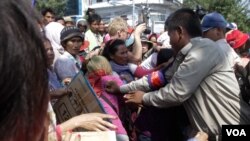Cambodia saw nearly 1,400 strikes and demonstrations in 2016, more than three times as many as the previous year, according to a recent police report.
The annual report on social order published by the Phnom Penh police last week said the security situation had become “complicated” and “adversely affects the well-being of the city”.
The report singled out protests organized by civil society “intending to overthrow the government.”
It said that in 2015 there were 443 recorded strikes and protests. Last year, 966 of the 1,400 reported civil actions were strikes by factory workers, while more than 350 were politically motivated protests and more than 200 were organized by citizen groups.
Phnom Penh Police Chief Chuon Sovann and Police Commissioner Phoung Malai could not be reached.
Opposition officials, human rights workers and land activists dismissed the report’s conclusion that civil society groups were trying to overthrow the government.
Mu Sochua, a Cambodia National Rescue Party lawmaker, said the strikes and demonstrations had proceeded peacefully and legally.
“The government made up the report since he [Prime Minister Hun Sen] is unwilling or unable to seek solutions for citizens,” she said.
“What has the government done over the past decade that has caused citizens to cry, immigrate, and forced them to the point where minors are dropping out of school?
“The only problem is the incompetence in leadership at all levels,” she added.
Bov Sophea, a land activist from Boeung Kak lake, agreed that the report was an attempt to make excuses for government failures.
“As a leader he was supposed to secure the nation,” she said of Hun Sen. “But rather he accuses his people and NGOs of plotting to overthrow the government.”
Am Sam Ath, monitoring director of local rights group Licadho, said despite the large upsurge in protests, they rarely reached a positive outcome.
“If there were no land seizures, there would be no protests.”







